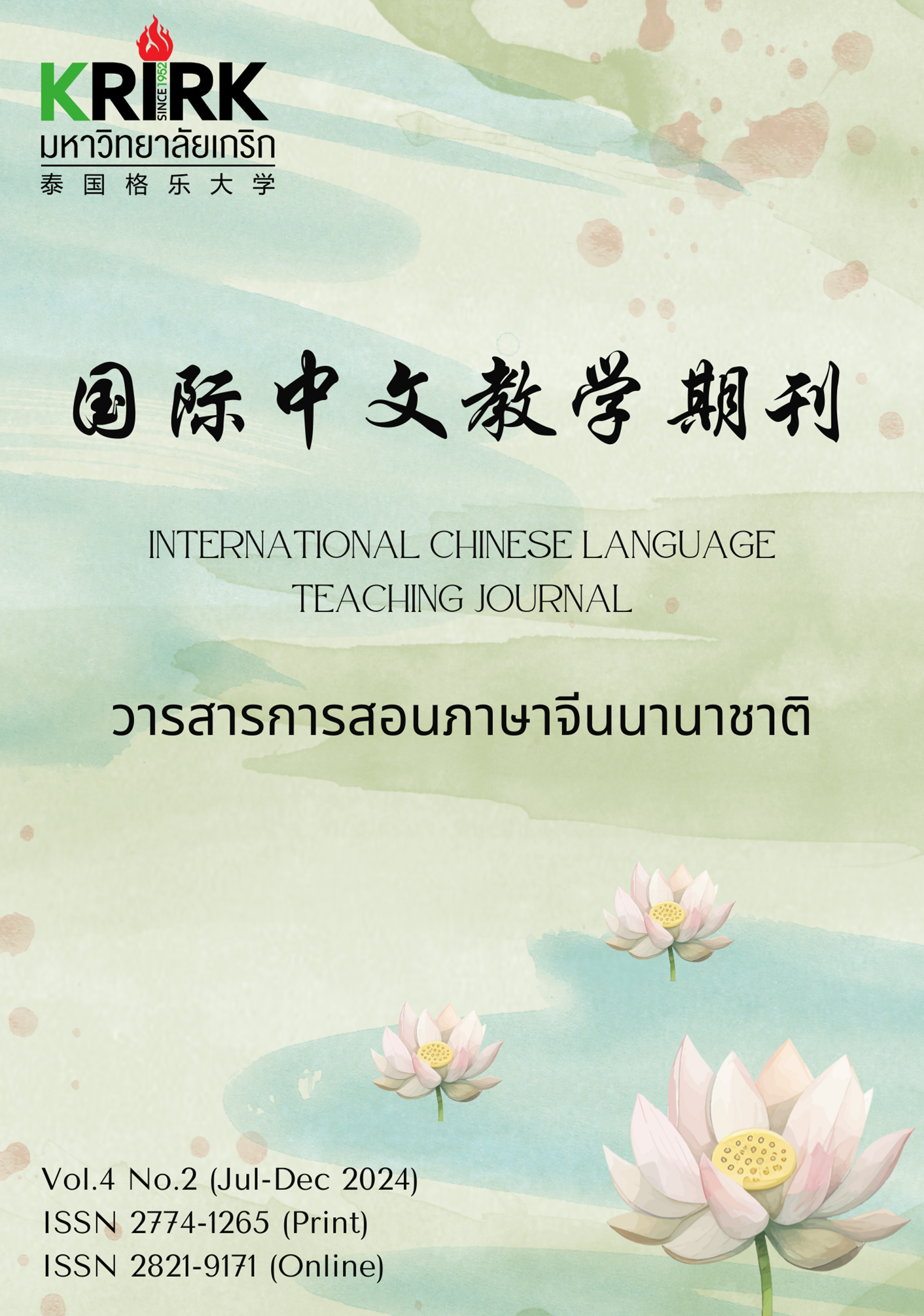AUTONOMOUS LEARNING ABILITY OF CHINESE LITERRTURE AND PHILOSOPHY OF THAI LOCAL UNIVERSITY STUDENTS AND ITS CORRELATION WITH ACADEMIC ACHIEVEMENT
Keywords:
Thai Local University Students, Autonomous Learning, Chinese Literature and Philosophy, CorrelationAbstract
In the study of the autonomous learning ability of foreign Chinese second language learners, there is currently a lack of more detailed research from a micro perspective on the autonomous learning ability of a specific language and culture course at the intermediate and advanced levels. Therefore, this paper adopts a research method that combines questionnaire surveys and interviews, and takes 291 third-year students from the school of sinology at Mae Fah Luang university as the participants. Based on the three-dimensional framework of “psychology-ability-behavior”, this paper explores the current situation of the autonomous learning ability of Chinese literature and philosophy courses of Thai local university students and its correlation with academic achievement. This study shows that: 1) The overall autonomous learning ability of the participants in Chinese literature and philosophy courses is at an average but close to a low level. Their autonomous learning ability shown in learning motivation, self-efficacy and autonomous learning behavior in and out of class is relatively weak; 2) In general, there is a moderate linear positive correlation between the autonomous learning ability of the participants in the Chinese literature and philosophy course and their academic achievement in the course, which shows that their autonomous learning ability has a certain predictive value for their academic achievement, but there is no simple causal relationship between the two; 3) The autonomous learning ability shown by the participants’ learning motivation and in-class autonomous learning behavior is relatively the key factor affecting their academic achievement among all their autonomous learning abilities. In view of this, it is crucial to enhance learners’ learning motivation and autonomous learning behavior in class by adjusting the learning difficulty, improving the academic achievement evaluation method, and improving the practicality of the course.
References
Akiko, MII. (2018). An Investigation and Analysis of the Autonomous Chinese Language Learning Ability of Japanese. Chinese Language Learning, 4, 88–95.
Chan, V., Spratt, M., & Humphreys, G. (2002). Autonomous Language Learning: Hong Kong Tertiary Students’ Attitudes and Behaviours. Evaluation and Research in Education, 16(1), 1-18.
Cohen, J. (1988). Statistical Power Analysis for the Behavioural Sciences (2nd ed.). Hillsdale, NJ: Lawrence Erlbaum Associates.
崔胤京(2014)。韩国汉语专业与非汉语专业大学生的自主学习与学习策略比较. 国际汉语教育,2,112-120+196-197。
Deci, E. L., & Ryan, R. M. (1985). Intrinsic motivation and self-determination in human behaviour. Berlin: Springer Science & Business Media.
丁安琪(2011)。教师对留学生自主学习能力培养状况的调查研究。语言文字应用,4,101-109。
高鹏、张学忠(2005)。大学英语课堂中学习者学习自主性的培养——一份自主式课堂教学模式实验报告。外语界,1,33-39。
Gardner, R. C., & Lambert, W. E. (1972). Attitudes and Motivation in Second Language Learning. Rowley, MA: Newbury House Publishers.
Guglielmino, L. M. (1977). Development of the Self-Directed Learning Readiness Scale. (Doctor’s Thesis). Athens, Georgia: University of Georgia.
郝红艳(2010)。自主学习模式与我国留学生教育发展研究。河南社会科学,18(6),189-190。
郝红艳(2015)。汉语言本科留学生自主学习能力的评估。高教发展与评估,31(3),30-36。
Holec, H. (1981). Autonomy and Foreign Language Learning. New York: Pergamon Press.
胡杰辉(2011)。外语自主学习能力评价——基于二维模型的量表设计。外语界,4,12-17+35。
华维芬(2009)。试论外语学习动机与学习者自主。外语研究,1,57-62。
金辉(2001)。自主学习理论及对外汉语教学最佳模式的研究。山西财经大学学报(高等教育版),2,16-17。
李斑斑、徐锦芬(2014)。成就目标定向对英语自主学习能力的影响及自我效能感的中介作用。中国外语,11(3),59-68。
李端(2016)。美国留学生学习动机、归因倾向于自主学习能力相关关系研究. 华东师范大学硕士论文,上海。
林才均(2023)。泰国大学生古代汉语自主学习能力及其与学习成绩的相关性研究。汉学研究,17(1),1-21。
林莉兰(2013)。基于三维概念的大学生英语自主学习能力量表编制与检验。外语界,4,73-80+96。
Littlewood, W. (1996), “Autonomy”: An Anatomy and a Framework. System, 24, 427-435.
倪清泉(2010)。大学英语学习动机、学习策略与自主学习能力的相关性实证研究。外语界,3,30-35+79。
Nunan, D. (1997). Designing and adapting materials to encourage learner autonomy. London: Longman.
庞维国(2003)。自主学习的测评方法。心理科学,5,882-884。
Park, G. (1997). Language Learning Strategies and English Proficiency in Korean University Students. Foreign Language Annals, 30, 211–221.
谭霞、张正厚(2015)。英语学习策略、 自主学习能力及学习成绩关系的分析。外语教学理论与实践,1,59-65+88。
田雨(2013)。印尼大学生汉语自主学习能力调查分析及教学对策研究——以智星大学中文学院大学生为例。 广东外语外贸大学硕士论文, 广州。
Ushioda, E. (2008). Motivation and Good Language Learners. In C. Griffiths (Ed.), Lessons from Good Language Learners (pp. 19-34). Cambridge: Cambridge University Press.
王艺儒(2020)。来华韩国学生汉语自主学习能力调查研究——以大连外国语大学为例。大连外国语大学硕士论文,大连。
Wenden, A. L. (1998). Metacognitive Knowledge and Language Learning. Applied Linguistics, 19 (4), 515-537.
Williamson, S. N. (2007). Development of a Self-Rating Scale of Self-Directed Learning. Nurse Researcher, 14, 66-83.
吴喜艳、张庆宗(2009)。英语专业学生自我效能、学习策略、自主学习能力与学业成就的关系研究。外语教学,30(3),43-62。
Xu, J. P. (2009). A Survey Study of Autonomous Learning by Chinese Non-English Major Postgraduates. English Language Teaching, 2(4), 25–32.
徐晓羽(2024)。汉语二语学习者自主学习研究。上海: 上海教育出版社。
徐晓羽、陈舒敏(2022)。三维评估框架下留学生学习自主性与成绩相关性研究。汉语学习,3,103-112。
杨巍(2014)。试论对外汉语教学中的自主学习。学习月刊,2,95-96。
Downloads
Published
How to Cite
Issue
Section
License
Copyright (c) 2024 International Chinese Language Teaching

This work is licensed under a Creative Commons Attribution-NonCommercial-NoDerivatives 4.0 International License.







